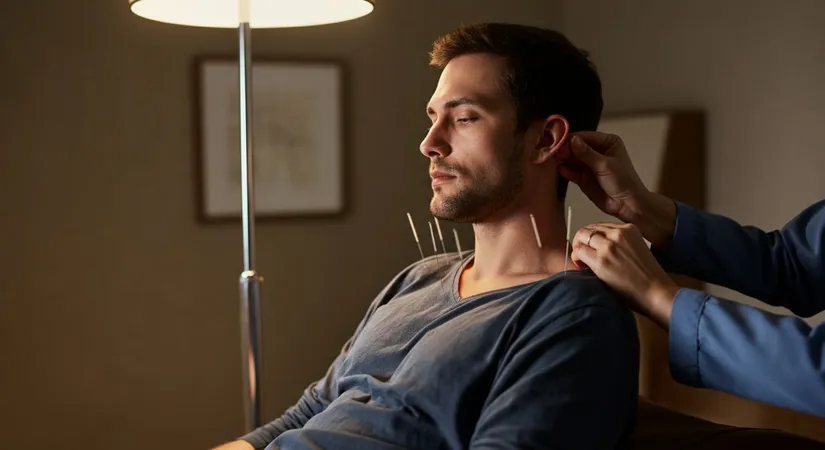Unlocking Acupuncture Benefits: How Does It Work for Holistic Healing?
Explore how acupuncture serves as a holistic remedy for pain relief and stress, rooted in ancient Chinese medicine.
Acupuncture has been long celebrated as a holistic healing practice derived from Traditional Chinese Medicine. It focuses on keeping the energy flow, known as Qi, balanced throughout the body. This ancient technique is gaining popularity for its ability to relieve pain, reduce stress, and treat various ailments. Discover how acupuncture can benefit your body and mind as we explore its mechanisms and applications.
Exploring the Benefits of Acupuncture Therapy
Acupuncture therapy, a cornerstone of traditional Chinese medicine, is renowned for its diverse health benefits. This ancient practice involves inserting fine needles into specific points on the body, known as acupuncture points, to stimulate energy flow and balance the Qi. By targeting these points, acupuncture therapy can address a wide range of conditions, enhancing overall health and well-being.Key Benefits of Acupuncture Therapy
- Relief from chronic pain, such as back pain and arthritis, through improved energy flow.
- Reduction in anxiety and stress levels by promoting relaxation and mental clarity.
- Improved digestive health by balancing the body's internal systems.
How Acupuncture Therapy Works
- Assessment: The therapist evaluates the patient's condition and identifies specific acupuncture points.
- Needle Insertion: Fine needles are gently inserted into the skin at targeted points to stimulate energy flow.
- Energy Balance: The therapy aims to restore balance to the Qi, enhancing physical and mental health.

How Acupuncture Alleviates Pain and Reduces Stress
Acupuncture treatment is a powerful tool for managing pain and stress, leveraging the body's natural healing mechanisms. By stimulating specific acupuncture points, this therapy releases endorphins, the body's natural painkillers, and reduces inflammation, providing effective pain relief.Mechanisms of Pain Relief in Acupuncture
- Endorphin Release: Acupuncture triggers the release of endorphins, which help alleviate pain naturally.
- Inflammation Reduction: The therapy reduces inflammation, a common source of chronic pain.
- Nerve Stimulation: Acupuncture points stimulate nerves, enhancing the body's pain response.
Steps in Acupuncture for Stress Reduction
- Initial Consultation: The practitioner assesses stress levels and identifies target points.
- Needle Placement: Fine needles are inserted to stimulate relaxation and calm the mind.
- Relaxation Phase: Patients experience a calming effect, reducing stress and promoting mental clarity.

Exploring Acupuncture Points for Headaches and Anxiety
Acupuncture therapy offers a unique approach to alleviating headaches and anxiety by targeting specific acupuncture points. These points, located on the head, hands, and feet, are strategically stimulated to promote relaxation and reduce tension. This method is rooted in traditional Chinese medicine and provides a holistic healing experience.Key Acupuncture Points for Headache Relief
- Yintang: Located between the eyebrows, this point helps relieve frontal headaches and stress.
- LI4 (Hegu): Found on the hand, this point is effective for tension headaches and pain relief.
- GB20 (Fengchi): Situated at the base of the skull, it alleviates migraines and neck tension.
Steps in Acupuncture for Anxiety Reduction
- Consultation: The practitioner evaluates anxiety levels and selects appropriate points.
- Needle Insertion: Fine needles are placed at targeted points to stimulate calming effects.
- Relaxation Phase: Patients experience a deep sense of relaxation, reducing anxiety symptoms.
The Role of Traditional Chinese Medicine in Acupuncture Treatment
Traditional Chinese Medicine (TCM) is integral to the practice of acupuncture, focusing on the harmonious balance of energy, or Qi, within the body. This ancient system of medicine enhances acupuncture's effectiveness in treating a variety of health conditions by employing a holistic approach.Core Principles of Traditional Chinese Medicine in Acupuncture
- Balance of Yin and Yang: TCM emphasizes maintaining equilibrium between these opposing forces to ensure health.
- Meridian Theory: Energy pathways, known as meridians, are crucial for directing Qi flow throughout the body.
- Five Elements: TCM uses the elements of wood, fire, earth, metal, and water to diagnose and treat imbalances.
Steps in Integrating TCM with Acupuncture
- Diagnosis: Practitioners assess the patient's Qi balance and identify any blockages or imbalances.
- Point Selection: Specific acupuncture points are chosen based on TCM principles to restore energy flow.
- Treatment: Needles are inserted to stimulate the body's natural healing processes, guided by TCM insights.
Acupuncture Therapy: A Holistic Approach to Wellness
Acupuncture therapy leverages the ancient principles of Traditional Chinese Medicine to balance the body's energy flow, known as Qi. By inserting fine needles into specific acupuncture points, this method stimulates energy pathways, promoting both physical and mental health.
Practitioners of acupuncture are trained in the intricate mapping of acupuncture points and the meridian system, ensuring precise application for optimal results. Their expertise in Traditional Chinese Medicine principles allows them to address a wide range of health conditions holistically.
Integrating Traditional Chinese Medicine for Comprehensive Care
The integration of Traditional Chinese Medicine principles in acupuncture treatment enhances its effectiveness, focusing on the balance of Yin and Yang and the meridian theory. This comprehensive approach ensures a holistic healing experience for patients.
Patients often report significant improvements in their overall well-being, attributing their enhanced health to the careful application of acupuncture techniques. The therapy's focus on both physical and mental health fosters trust and satisfaction among those seeking alternative treatments.
Frequently Asked Questions
What are the main benefits of acupuncture therapy?
Acupuncture therapy offers numerous benefits, including relief from chronic pain, reduction in anxiety and stress levels, and improved digestive health. By balancing the body's energy flow, known as Qi, acupuncture enhances overall well-being and promotes both physical and mental health.
How does acupuncture work for pain relief and stress reduction?
Acupuncture works by stimulating specific points on the body to release endorphins, the body's natural painkillers, and reduce inflammation. This process not only alleviates pain but also promotes relaxation and mental clarity, making it effective for stress reduction.
What role does Traditional Chinese Medicine play in acupuncture treatment?
Traditional Chinese Medicine (TCM) is integral to acupuncture, focusing on balancing the body's energy, or Qi. TCM principles, such as the balance of Yin and Yang and the meridian theory, guide the selection of acupuncture points to restore energy flow and enhance treatment effectiveness.
Is acupuncture therapy safe for managing anxiety and stress?
Acupuncture therapy is considered safe for managing anxiety and stress when performed by a trained practitioner. It targets specific points to promote relaxation and reduce tension, offering a holistic approach to mental well-being without the side effects associated with some medications.
How is acupuncture therapy integrated with Traditional Chinese Medicine principles?
Acupuncture therapy is integrated with Traditional Chinese Medicine by assessing the patient's Qi balance and selecting acupuncture points based on TCM principles. This approach ensures a comprehensive treatment that addresses both physical symptoms and overall energy balance for improved health.
Discover the Path to 'Healthy Beauty' with estethica's Expert Care!
📞 Call Now for Your Free Consultation!
Fill in the Form
We call you immediately